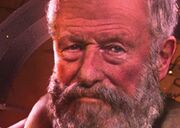m (Bot: Cosmetic changes) |
(Adding categories) |
||
| (2 intermediate revisions by the same user not shown) | |||
| Line 18: | Line 18: | ||
The Doctor warned Galileo that should remain quiet about some of his ideas that would be seen as [[heresy|heretical]]. For his belief in [[heliocentrism]], the [[Catholic Church]] put Galileo on [[trial]] for heresy and he was sentenced to house arrest in [[Arcetri]]. His daughter, [[Virginia Galilei|Virginia]], died in [[1634]], after which [[Fortuna (The Galileo Trap)|Fortuna]] took her place. Although he was aware of this, he was pleased to have his daughter back. |
The Doctor warned Galileo that should remain quiet about some of his ideas that would be seen as [[heresy|heretical]]. For his belief in [[heliocentrism]], the [[Catholic Church]] put Galileo on [[trial]] for heresy and he was sentenced to house arrest in [[Arcetri]]. His daughter, [[Virginia Galilei|Virginia]], died in [[1634]], after which [[Fortuna (The Galileo Trap)|Fortuna]] took her place. Although he was aware of this, he was pleased to have his daughter back. |
||
| + | [[File:Galileo 1639.jpg|thumb|left|Galileo in [[1639]]. ([[AUDIO]]: ''[[The Galileo Trap (audio story)|The Galileo Trap]]'')]] |
||
In [[1637]], Galileo was blinded when he used his [[telescope]] to view what he named [[Phaiton]]. Fortuna gifted him a [[celestial projector]] which he used to spy on her and [[Cleaver (The Galileo Trap)|Cleaver]], who made him record a message for the Doctor to lead him into a trap. When the [[Eighth Doctor]] arrived, Galileo offered him what help he could and encouraged [[Helen Sinclair]] to continue travelling with him. ([[AUDIO]]: ''[[The Galileo Trap (audio story)|The Galileo Trap]]'') |
In [[1637]], Galileo was blinded when he used his [[telescope]] to view what he named [[Phaiton]]. Fortuna gifted him a [[celestial projector]] which he used to spy on her and [[Cleaver (The Galileo Trap)|Cleaver]], who made him record a message for the Doctor to lead him into a trap. When the [[Eighth Doctor]] arrived, Galileo offered him what help he could and encouraged [[Helen Sinclair]] to continue travelling with him. ([[AUDIO]]: ''[[The Galileo Trap (audio story)|The Galileo Trap]]'') |
||
| Line 38: | Line 39: | ||
Galileo appeared in the ''[[Doctor Who Annual 1970]]'' feature [[A Matter of Gravity]], which described his [[1589]] experiments on [[gravity]] at the [[Leaning Tower of Pisa]]. |
Galileo appeared in the ''[[Doctor Who Annual 1970]]'' feature [[A Matter of Gravity]], which described his [[1589]] experiments on [[gravity]] at the [[Leaning Tower of Pisa]]. |
||
{{NameSort}} |
{{NameSort}} |
||
| − | |||
[[Category:16th century individuals]] |
[[Category:16th century individuals]] |
||
[[Category:Human astronomers]] |
[[Category:Human astronomers]] |
||
| Line 49: | Line 49: | ||
[[Category:People from the real world encountered by the Eighth Doctor]] |
[[Category:People from the real world encountered by the Eighth Doctor]] |
||
[[Category:Mathematicians from the real world]] |
[[Category:Mathematicians from the real world]] |
||
| + | [[Category:Blind individuals]] |
||
Revision as of 13:47, 6 September 2020
Galileo Galilei was an Italian mathematician, astronomer and philosopher.
Biography
In 1609, Galileo was in Venice to show the Doge his telescope when he encountered the First Doctor, Steven Taylor and Vicki Pallister, who had come to Venice responding to a mysterious invitation. Since the Doctor required Galileo's assistance at the same time he was scheduled to demonstrate the invention, Steven had to impersonate Galileo by means of a holographic disguise. The Doctor also helped Galileo improve his telescope design. (PROSE: The Empire of Glass)
The Doctor warned Galileo that should remain quiet about some of his ideas that would be seen as heretical. For his belief in heliocentrism, the Catholic Church put Galileo on trial for heresy and he was sentenced to house arrest in Arcetri. His daughter, Virginia, died in 1634, after which Fortuna took her place. Although he was aware of this, he was pleased to have his daughter back.

Galileo in 1639. (AUDIO: The Galileo Trap)
In 1637, Galileo was blinded when he used his telescope to view what he named Phaiton. Fortuna gifted him a celestial projector which he used to spy on her and Cleaver, who made him record a message for the Doctor to lead him into a trap. When the Eighth Doctor arrived, Galileo offered him what help he could and encouraged Helen Sinclair to continue travelling with him. (AUDIO: The Galileo Trap)
Galileo later saw the effects of the Eleven's stellar manipulator on the Sun, believing it to be the end of the world. (AUDIO: The Satanic Mill)
The only complete transcript of Galileo Galilei's trial was kept in the Library of St John the Beheaded. (PROSE: All-Consuming Fire)
References
Professor J. P. Kettlewell mentioned Galileo while speaking about unappreciated scientists with the Fourth Doctor. (TV: Robot)
In the late 15th century, the Fourth Doctor noted, while using Giuliano's telescope, that in another fifty years they could have used Galileo's. (TV: The Masque of Mandragora)
The Fourth Doctor thought Galileo would be impressed by in-station fusion satellites, devices used as artificial suns. (TV: The Sun Makers)
Sarah Jane Smith said that she didn't think that Galileo and Copernicus were carrying out experiments in the paranormal. (TV: The Lost Boy)
In the 23rd century of a parallel universe, a shuttlecraft attached to the USS Enterprise (NCC-1701) was named Galileo. (COMIC: Assimilation²)
Behind the scenes
Galileo appeared in the Doctor Who Annual 1970 feature A Matter of Gravity, which described his 1589 experiments on gravity at the Leaning Tower of Pisa.
